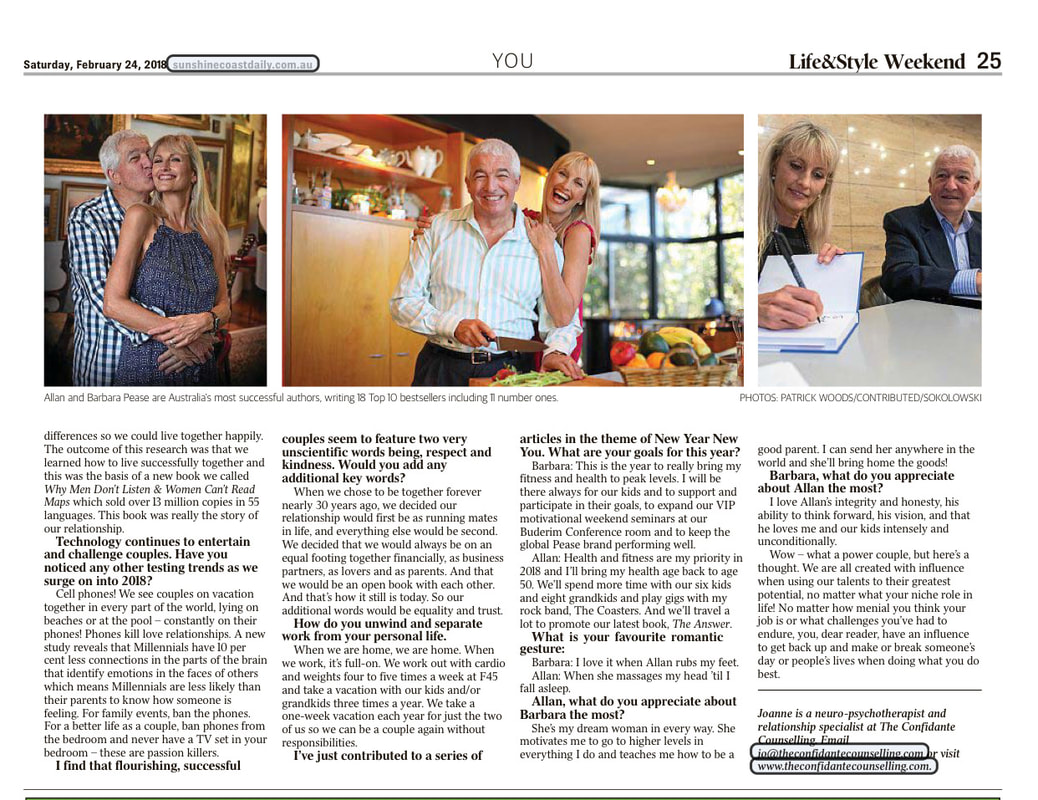#7 of the Top 10 Worst Relationship Mistakes: You've overlooked the pandemic's psychological scars6/2/2023
I’m certainly not one to encourage peering into life’s revision mirror for too long, however it is worth giving yourself some recognition for making it through the recent years we have endured. Now that you’ve patted yourself on the back, let’s take a look at yourself and check you’re not making the 7th top relationship mistake I notice in the couple’s therapy room.
It’s not very often when we can reflect back on an event in world history that has affected everyone on the planet in some way. I am sure most of us have not arrived to 2023 without being unscathed in some manner by (a word we are all tired of hearing), the pandemic. Have you overlooked any lingering effect on your mental health and how you now show up in your relationship? You are encouraged to circle back to self-reflect using the prompts at No #5 of this blog series. In the meantime, why not just take a moment to consider all those important aspects of you that your partner was first attracted to? Do you still offer those same characteristics now?
What self-nurture is required to help get back to the best version of you?
You could even evaluate the quality of your connection by asking yourself these thoughtful questions often used in PACT Therapy designed to encourage emotional safety in your relationship:
Joanne Wilson is the Relationship Rejuvenator and author of Renovate Your Relationship – All The DIY Tools For Your Most Important Project ($29.99). She is a neuropsychotherapist inspiring the community for thriving and dynamic relationships that impact generations for mental well-being. Find out more on her online courses at www.relationshiprejuvenator.com Photo by Jeffrey Grospe Welcome to the “Top 10 Worst Relationship Mistakes” series as noticed in the counselling room. You are welcome to enjoy this also from personal experience as a married relationship therapist who is living and breathing the wondrous relationship reality! Not only have I made many of these mistakes myself, but it is helpful to be reminded that we have our “best attempts to cope” with relationship situations, and I believe we are not inherently mean! This series does not include malicious behaviours such as narcissism or those that result in abuse from being under the influence of alcohol and drugs. Whilst these are massive mistakes, this series reflects those common errors that undermine great relationship dynamics. To kick off this series, let’s go with a so very important topic: Leaving it to one person to initiate Intimacy. The focus here is not just sex, but touch of any form such as cuddles, rubs, cute little slaps, tickles – any form of physical connection! Stereotypes would assume that blokes will always be the one to initiate sex, however this truly isn’t the case. There are thousands of libidinous females out there who long for the touch of their partner and for all sorts of reasons aren’t able to enjoy this. For either sex, when it is always left to them to physically reach out for love, it eventually results in rejection, then even symptoms of grief. The beautiful dialogues that I have the privilege of hearing in the counselling room, include the sense of vulnerability, fulfillment, heightened sense of masculinity or femininity that results when there is mutual and consensual enjoyment through intimacy. Unless it is otherwise arranged, why not check in with your partner on their level of fulfillment on who is kicking things off in the bedroom, the kitchen or wherever is a good place for you to enjoy contact? Take this chance to enjoy a healthy conversation on: - What does sexual fulfillment mean? - In their opinion, who usually initiates intimacy? - What flirtatious activities do you appreciate outside the bedroom? - What's on your Intimacy Wish List? Check out this series on my Instagram TV channel and the Podcast! Joanne Wilson is the Relationship Rejuvenator and author of Renovate Your Relationship – All The DIY Tools For Your Most Important Project ($29.99). She is a neuropsychotherapist inspiring the community for thriving and dynamic relationships that impact generations for mental well-being. Find out more at www.relationshiprejuvenator.com Photo by Yuris Alhumaydy on Unsplash The Noosa Festival of Surfing commenced on the weekend here with nine whole days of beautiful waves, boards, beaches, and surfing. Now this, is what the Sunshine Coast is all about. I have therefore teamed it with nine hot tips to overcoming your biggest block to deeply connected relationships in this Intimacy Inhibitors series.
This series is designed to rescue you from drowning in the ho-hum boring drum of flat conditions featuring less than fulfilling relationships with unnecessary large reef rocks to enjoying connection and deep love. If you're methodical like me and need order, click on these previous articles, where I've covered: Alongside the endless list of common human fears of sharks, jellyfish and needles in the sand is fear of rejection. It's an invisible phobia that causes us to recoil in horror, shock and sadness that can disable us for months, if not years at a time with devastating effects of being alienated, disappointed and lonely. This is particularly long-lasting when repeatedly experienced as a child when a decision is subsequently made to avoid relying on others at all costs. Translate this behaviour to an adult intimate relationship and it’s a massive inhibitor to reaching out and enjoying closeness. What do we do about it? We harness the power of our mind which is fabulously renewable, neuroplastic and fundamentally, changeable! You are not a victim to the tides that come and go to helplessly drift with the unhelpful decisions and beliefs of your past. Here are your 9 Mind Management strategies for fear: 1. Check your antenna frequency (refer to the first article in this series) 2. Tune in to your internal newsreel? What fearful words are you speaking into your life when you wake, washing the dishes, driving or surfing? 3. Write them down and consider when and why you bought into any of those toxic thoughts. 4. Write down three decisions you made as a result of these experiences to avoid future pain. 5. Validate your ingenious inherent design to adopt these self-preservation behaviours. 6. Write down three ways these decisions are not helping you enjoy intimacy and true closeness? 7. What three or more feelings do they evoke? 8. Ask yourself the benefit of bravely expressing them to someone? 9. Write down what life-giving, motivating and nurturing words you could be speaking into your life instead and ensure they infiltrate your world. So drop into these 9 steps to approaching the exhilarating ride of intimacy. It won't always be a perfect 10 and there will be a few wipeouts. Like any new skill, it requires repetition and you'll be stoked with the results. Joanne Wilson is a neuropsychotherapist, relationship specialist, workshop facilitator and guest speaker. Tune into radio Salt106.5 each Friday morning for her co-host of the Morning Wakeup. Don’t miss more on these articles in her “Is This Love” Podcast and download your FREE relationship resources at www.relationshiprejuvenator.com What are you scared of? Spiders, snakes, dogs, heights, flying, enclosed spaces, needles, storms? The list is endless of what frightens the heck out of us. What about the one we can’t physically see that’s on top of the list of what petrifies humans (according to me)? What is this invisible phobia that causes us to recoil in horror, shock and sadness that can disable us for months, if not years at a time? Rejection. And what does rejection cause? Fear. I’m spearheading through my first series for your 2020 – “Intimacy Inhibitors”. It’s designed to stop you in your tracks to ensure you’re not sabotaging your relationships with unnecessary road-blocks to your intimate relationship. These inhibitors are evident in my counselling room over and over again so why not cut your mistakes short and enjoy insight from the progress achieved from countless courageous clients over the years? I’m longing for you to be “naked to the soul” in realising your true design to enjoy being with another special person and all the vulnerability that goes with it. I acknowledge the importance of feeling safe and secure when we can count on turning to our loved ones for support, love and connection. This doesn’t necessarily apply to just intimate partners but allowing our friends and family in. You flourish when you allow people into your inner world. Why would you do this? Because you fair much better when you share the load. Your brain lights up when you compassionately support someone else. You navigate the world knowing someone has got your back despite your flaws, failings and mistakes. Why don’t we do this?
Fear and rejection. I can guarantee everyone on this planet has suffered rejection and all the devastating effects of being alienated, disappointed and lonely. This is particularly long-lasting when repeatedly experienced as a child when a decision is made to avoid relying on others at all costs. Translate this behaviour to an adult intimate relationship and it’s challenging to reach out and enjoy closeness. What do you do about it? Realise your default personal news reel. After over a decade of counselling I’ve come to realise, no matter your charmed or compromised background, human nature sadly and too easily defaults to worthless self-talk. If we allow life’s whacks, clobbers and thrashings to permanently wire us to avoidance, we are trapped in pain and isolation. We’re more likely to judge and criticise others to deflect the perceived short-comings from within - all rooted in fear. I look forward to stepping you through some steps to overcoming fear - this massive inhibitor to intimacy next week. Joanne Wilson is a neuropsychotherapist, relationship specialist, workshop facilitator and guest speaker. Tune into radio Salt106.5 each Friday morning for her co-host of the Morning Wakeup. Don’t miss more on these articles in her “Is This Love” Podcast and download your FREE relationship resources at www.relationshiprejuvenator.com  School is back in, Aussie trade in full swing, Valentine’s Day florists soon go “ka-ching”, ... and for me – great timing! Yes, it’s a fabulous time of year for my latest and greatest momentous topic of utmost importance for your 2020, drum roll… “Intimacy Inhibitors”. Turn the pages to this section of this magazine in recent years and you’ll be well familiar with my frequently used term, “we are designed relationally”. That is, we feel safe and secure when we can count on turning to our loved ones for support, love and connection. Turn the pages of your life, and you’ll recall your highlight reel features sharing great moments with others, feeling loved, valued or appreciated. There are so many themes around this topic in the counselling room. I can’t wait to share with you some wonderful insights to giving and receiving the love you deserve. Where do we start? We get “naked to the soul”. Sounds a bit rude, however this is more about getting authentic with your own needs and turning on your “attachment antennae” to a healthy frequency. This wonderful analogy was gifted by authors and practitioners, Kallos-Lilly and Fitzgerald in their contribution to Emotionally Focussed Therapy. They explain those who’ve enjoyed positive childhood experiences of connecting with their parents of caregivers naturally tend to extend this to their romantic relationships. Those who’ve experienced a less than ideal childhood can feel a sense of loss and emptiness for what was missed. As a result, our inherent need to survive and feel safe prompts some people to turn up their antennae or alert button to rejection from others. They can be hyper-sensitive to feelings of anxiousness when they sense others might let them down. They can be clingy and needy or try to control their partner to keep safe. Alternatively, those who keep their antennae turned down too low ensures they stay independent, avoid closeness and keep their distance. Both frequencies are their best attempts to cope to avoid the insecurity from a threatened bond with those closest and dear. Understanding the needs of such anxious or avoidant behaviours is a helpful head start to appreciate and respect their need for space or responsiveness. I look forward to revealing further aspects of being “naked to the soul” next week. Joanne Wilson is a neuropsychotherapist, relationship specialist, workshop facilitator and guest speaker. Don’t miss more on this in her “Is This Love” Podcast and download your FREE relationship resources at www.relationshiprejuvenator.com  Social connectedness has a bigger impact on health than giving up smoking, reducing excessive drinking, reducing obesity and any other preventative interventions? Whilst these strategies are going to enhance your lifestyle, modern medicine is realising the importance of integrating the most effective intervention for improving health and longevity - social relationships! This month, I’m highlighting the contribution of social researcher and bestselling author, Hugh Mackay whose accolades include an Officer of the Order of Australia and Fellow of the Australian Psychological Society to name a few. I was honoured to interview Hugh and taking much delight in revealing his insight and wisdom that complements my contribution as a Relationships Therapist. We are created relational social beings. When we feel loved, secure and attached to our people and surroundings, we flourish. Look beyond the symptoms of our anxiety epidemic and you’ll likely see social fragmentation behind it. An example of social fragmentation is one household in four has one person living in it with this trend set to decrease to one in three. Fragmentation features 35%-40% of marriages that end in divorce (a massive ripple effect on society and generations including children who transition between parents’ houses or choose to live independently earlier.) Busyness is our badge of honour and the information technology boom that as Mackay says, “makes us feel more connected than ever before. On the other hand, it makes it easier than ever for us to stay apart from each other and to settle for a text or a tweet, rather than a phone call, let alone a cup of coffee. We are getting used to the idea that you can communicate without human presence.” In my experience in the Counselling room, loneliness and disconnection is usually the root cause of addictions. “For too long now, we have been living in a society that revolves around individualism and consumerism.” says Mackay, citing them as the “twin vanities”. Hugh emphasizes this in what he calls being entangled in the QPL syndrome: the quest for the perfect latte. He says our sense of lack of control in the world causes us to seek fulfillment through bathroom renos, breast implants, enviable holidays we can Instagram and demand the perfect latte. We are ensnared in the false belief we will be happy when we get what we think we deserve. In reality, it is a never-ending chasm to fill and the root of entitlement and narcissism. Mackay says we have “lost sight of our true nature as people who belong to a society. We are, each of us, organically linked to the whole; its problems are our problems; the pain of any is the pain of all”. Beyond Blue reveals two million Australians are suffering from a diagnosed anxiety disorder. Whilst youth suicide is falling, sadly our overall rate of suicide is still rising. Men are three times more likely to die of suicide, with approximately six male deaths per day. What is going to counteract these frightening statistics? Find someone to work out or walk with, call a buddy for a beer, join the choir, pottery class and be brave enough to knock on your neighbour’s door. Your brain lights up when you’re connected, needed and contributing to the lives of others. Fellas can have a chilled out catch up at Sunshine Coast’s very own local initiative, www.grablifebytheballs.com.au which is expanding across Australia. There’s a plethora of women’s networking events in business, playgroups and hobbies. Use your screen for good today to search out some connections suited to you and courageously make contact. You’ll likely live a longer and healthier life. I personally think it’s ok if you enjoy finding good coffee! If you’d like to know more on the Suicide Prevention Program at the Sunshine Coast Mind and Neuroscience -Thompson Institute, visit www.thealliance.org.au. Joanne Wilson is a neuropsychotherapist, relationship specialist, workshop facilitator and guest speaker. Don’t miss more on this in her “Is This Love” Podcast and download your Spouse It Up Guide at www.relationshiprejuvenator.com Each year I notice the final few months of the year feature a significant buckling in relationships as couples try and power through in the lead up to Christmas. The intensity rises due to common struggles such as financial strain, too many social commitments and uncommunicated needs. From my experience, infidelity seems to peak, as does anxiety.
One thing we should all know is how many Australians are suffering from either depression or anxiety. Hopefully as Mental Health week is recognised each year, we are increasingly aware to confront the silent sufferers in the ‘grip of our mental health crisis’ as highlighted by Hugh Mackay, Sociologist, Psychologist and Social Researcher. I’ve been honoured to interview Dr Mackay and look forward to communicating as much wisdom on his wealth of research in the coming weeks. Mackay quotes Beyond Blue in that “two million Australians are suffering from a diagnosed anxiety disorder.” He says, “The good news is that the rate of youth suicide is falling. The bad news is that our overall rate of suicide is still rising… Fortunately, not all of those attempts succeed.” One encouraging glimpse of hope is the work of our very own Sunshine Coast Mind and Neuroscience -Thompson Institute. They are paving the way in ground-breaking research in suicide prevention which looks promising to turn around these statistics significantly. One major theme for Hugh Mackay's work is his observation of our socially-fragmented society evident more than any previous time in our history. Why are our relationships in the community suffering?
There are a lot of folk I know living alone who love hogging the television remote all to themselves. Whilst they can enjoy such benefits as leaving as many dishes on the sink whenever they like, many do experience significant loneliness. Loneliness is said to be in the top three social challenges facing Australia. It sounds like time for Sunshine Coasters to launch ourselves from our enviable surroundings to defy these trends. We are created relationally, are social beings. When we feel loved, secure and attached to our people and surroundings, we flourish. Look beyond the real symptoms of anxiety and you’ll see the social fragmentation behind it. In my experience, loneliness and disconnection is usually the root cause of addictions too. I look forward to revealing more of Hugh Mackay’s work in the coming weeks. In the meantime, do email me to let me know you’ve had a cuppa with your neighbour. Joanne Wilson is a neuropsychotherapist, relationship specialist, radio co-host, workshop facilitator, guest speaker and weekly columnist for the Sunshine Coast Daily. Visit www.relationshiprejuvenator.com for your head start to reviving your relationship and listen in to her podcast discussing these articles and more, "Is This Love?" If you’d like to know more on the Suicide Prevention Program at the Sunshine Coast Mind and Neuroscience -Thompson Institute, visit www.thealliance.org.au and for urgent assistance, contact Lifeline on 131144. I’m passing on a beaut little “go to” designed to keep your relationships thriving as well as beat off depression and anxiety. As featured last week, I had the honour of interviewing US neuropsychologist, Dr John Arden who’s devised a handy acronym that creates a happy and healthy brain. Post this up in your bathroom mirror for a constant reminder on ways to inspire SEEDS of joy for a fulfilling lifestyle, especially as we head on into the winter months here in Australia: S is for Social Connectivity: I know it can get so “peoply” out there sometimes but like it or not, we are designed relationally and thrive on emotional attentiveness. Loneliness causes cellular changes resulting in a weakened immune system, a propensity for addiction and even early symptoms of dementia! Our telomeres (caps on the end of our chromosomes) can shrink without cultivated and fostered social brain networks. Keep yourself engaged with real time authentic family or friends versus online acquaintances, likers and followers! E is for Exercise: Dr Arden says exercise is better than any anti-depressant or anxiety tool on the planet! He encourages 30 minutes of increased heart rate activity every day to stave off the blues. An array of awesome brain-enhancing biochemical processes occurs when we exercise which include producing new neurons in our brain. (No wonder all my best ideas are invented during a long jog, though unsure about the science of new concepts in the shower yet!). E is for Education: I’m sure you’ve heard, “If you don’t use it, you lose it”- true story. If you’re not constantly learning, you’re not building an infrastructure of brain connectivity. The more connectivity, the richer your cognitive reserve later in life. I recently read about Yale professor, Paul Bloom who specialises in cognitive psychology and pleasure research. He says pleasure doesn’t just occur – it develops. Want to know how to get it? He says study more! Aside from a headache from guzzling a lot of expensive wine frequently, we know it won’t provide as much happiness as if you were to learn about wine along the way! Instead of seeking delight from experiencing something over and over, gain knowledge from your object of pleasure. D is for DIET: Feed your brain with nutritious fuel as your brain chemicals need it. A diet of fried hot chips and sauce will starve your amazingly created head of healthy neurotransmitters. Do that and you’re up against it to think clearly and positively. Neuroscientist Dr Caroline Leaf states 95% of your serotonin and half of the dopamine in the body are produced in your gut. Importantly, don’t fall into the trap of the unnecessary sense of urgency to eat on the go. Eat slowly until you’re 80% full and let your mind be your guide – not your eyes! S is for Sleep: Achieving functional sleep is a deterrent for depression and anxiety. Dr Arden says sleep medications can hinder our sleep cycle required to naturally consolidate memories. Did you know your brain and body stays quite active when we sleep as it plays a housekeeping type role removing toxins? When we mess it all up with drugs and alcohol, it makes sense we experience that very apt term I recently heard of, “hangxiety” and dreadful symptoms afterward. Do it often enough and you get depressed and anxious. Struggling in this area? Start with mindfulness, prayer, exercise or a therapist to collaborate on sleep strategies to combat any over-thinking at all the wrong times. Happy planting and join me next week for another great way to light up the reward centres of your brain! Email me if you’d like more information on Dr Arden’s SEEDS Worksheet and don’t forget to listen in for my interviews with some of the esteemed authors and neuroscientists from the conference on Friday mornings Salt 106.5 breakfast show with Kristian. Joanne Wilson is the weekly columnist for the Sunshine Coast Daily Weekend magazine, weekly Friday morning radio co-host on Salt106.5, professional relationship counsellor and certified neuropsychotherapy practitioner of TheConfidante Counselling. She is based on the Sunshine Coast, Queensland - Australia. You can contact her at: www.theconfidantecounselling.com or email HERE.  How’s your day? Maybe not so good? Has your year been an absolute shocker? Are you going through a rough patch? Made some major life mistakes? Grieving through separation or death? Feeling on the outer circle, unattractive, a failure or lonely? New to the Sunshine Coast and don’t know anyone? As depression and anxiety continues to rise, I’ve got an idea to support anyone experiencing bad days that extend into weeks. You may have read the beautiful poem about seasons from Ecclesiastes 3: 1-8 that includes, “There’s a time to break down, and a time to build up; A time to weep, and a time to laugh; a time to mourn, and a time to dance; A time to cast away stones, and a time to gather stones together; a time to embrace, and a time to refrain from embracing; A time to get, and a time to lose; a time to keep, and a time to cast away; A time to rend, and a time to sew; a time to keep silence, and a time to speak…” Is this your worst time? Take even the smallest step to turn toward someone else’s time. Turn your shocking time into your best time by gifting a service to someone. There sure is a time to grieve and be sad, but one wonderful strategy to move from that time is finding the greatest fulfillment in what I believe is inherent in our human design – serving others. Even you have unique talents awaiting to be gifted to others. A neighbour, a stranger or an organisation will be forever grateful for the day you chose to turn your own atrocious, depressing day into your best. This is the day when you put your hand up and extended it to care. Last week was the 30th year celebration of National Volunteer Week that gratefully honours volunteers. This year’s theme is “Making the World of Difference” and you can too! Search #NVW2019 online for inspiring memes and stories. Surprise someone in your street with a home-made yummy something, pay for someone’s coffee anonymously, deliver food hampers, work at the soup kitchen, create, craft or build anything required. If you can’t think of anything, check out www.volunteeringqld.org.au. Here are their reasons why you will benefit as it offers the chance to:
Don’t allow adversity to consume you. Consume it by making a world of difference and one step closer to your time to dance. Joanne Wilson is the weekly columnist for the Sunshine Coast Daily Weekend magazine, weekly Friday morning radio co-host on Salt106.5, professional relationship counsellor and certified neuropsychotherapy practitioner of TheConfidante Counselling. She is based on the Sunshine Coast, Queensland - Australia. You can contact her at: www.theconfidantecounselling.com or email HERE. Easter can be a tough time. Easter is a holiday period that often provides days off but with less activities than what is organized and available at Christmas. Some of you may be required to work right through?
Colleagues and acquaintances may have gone travelling on exotic enviable holidays, or busy with their families? Single parents whose children are off with former spouses can feel emptiness as well. The loss of a partner may feel particularly acute. As the weather becomes cooler it may that bit harder to be motivated to go out. In an increasing individualistic society, it can be relaxing and positive to have real “down time” in a world filled with constant contact through smart phones, e-mail and social media. It can also lead to feelings of loneliness. Some find themselves in difficult family situations over the extended holiday time. There is an emphasis on family, friends and chocolate gifts on TV that may simply reinforce what we might be missing. Loneliness is a real problem and we need to be aware of it
Joanne Wilson is the weekly columnist for the Sunshine Coast Daily Weekend magazine, weekly radio guest, professional relationship counsellor and certified neuropsychotherapy practitioner of TheConfidante Counselling. She is based on the Sunshine Coast, Queensland - Australia. You can contact her at: www.theconfidantecounselling.com or email HERE. |
Joanne WilsonJoanne will be your Confidante, enabling you to speak freely in complete confidence and serenity. An integrated approach tailored to your specific needs will be utilised.
Categories
All
Archives
October 2023
|
Joanne will be your Confidante, enabling you to speak freely in complete confidence and serenity. An integrated approach tailored to your specific needs will be utilized. Approaches such as Psychobiological Approach to Couple's Therapy (PACT), Cognitive Behavioral Therapy, Solution Focused Therapy and Emotionally Focused Therapy may be incorporated.
Joanne WilsonRelationship Specialist for individuals and Couples online around the world and servicing areas for virtual sessions around Australia and servicing many clients in Queensland including Caloundra, Noosa, Noosaville, Buderim, Mountain Creek, Gympie.
|
Quick links |
|
Queensland - Australia
0409 909 933
www.relationshiprejuvenator.com
|
|
©
2017-2023 The Confidante Counselling . All Rights Reserved
Web Design by Debbie Navarro












 RSS Feed
RSS Feed









